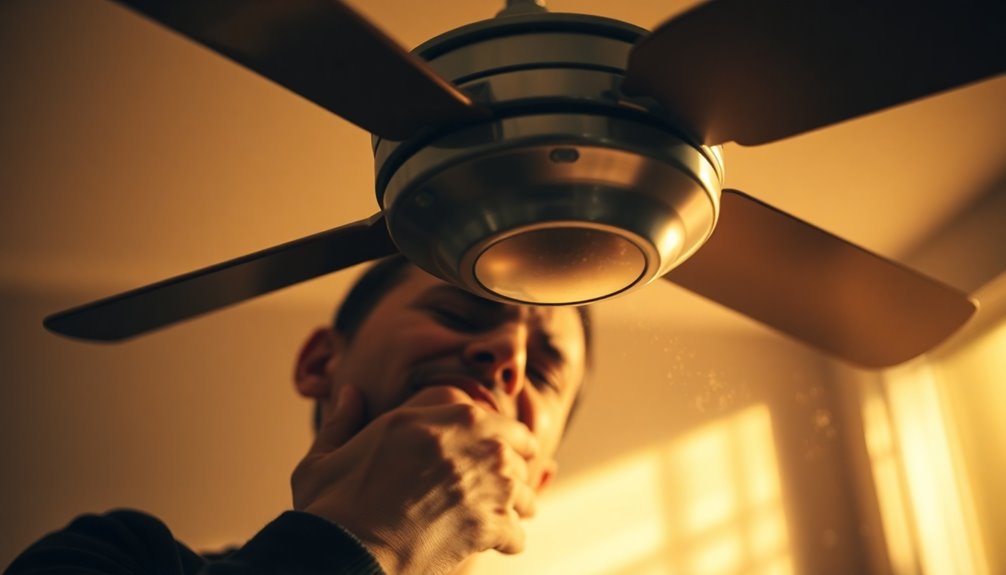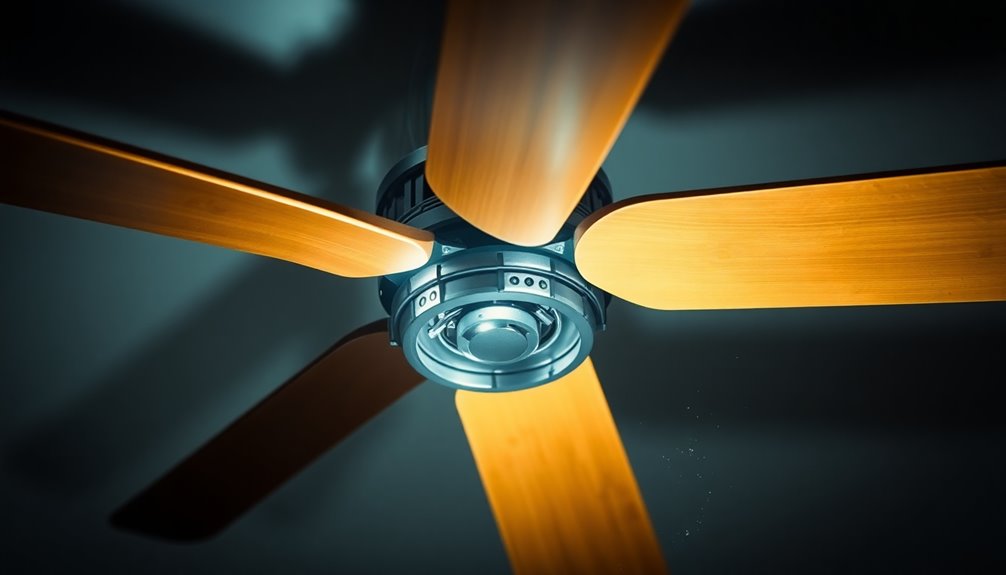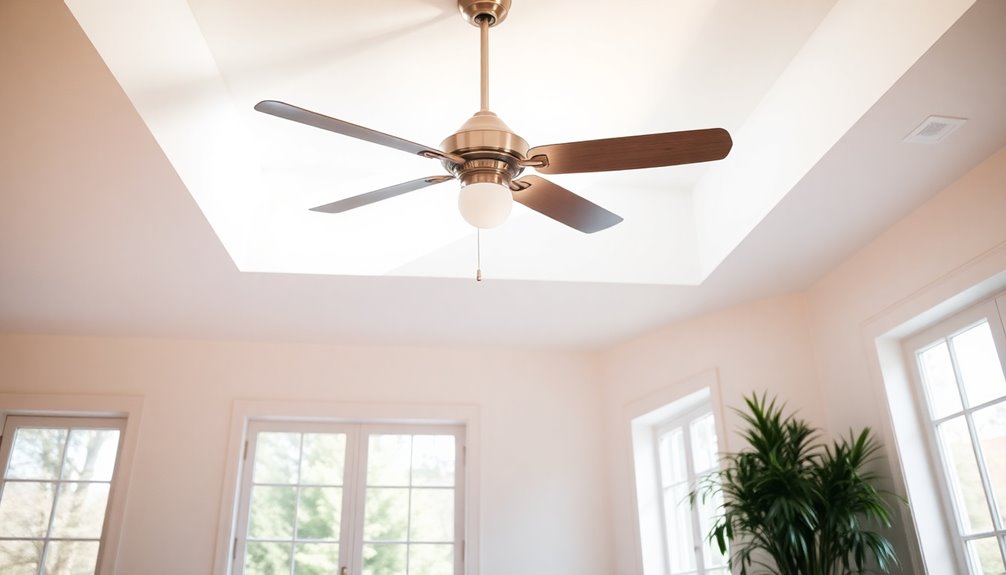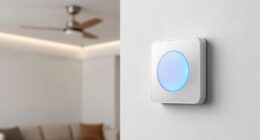Yes, ceiling fans can make your cough worse. They circulate dust, pollen, and other allergens, which can aggravate your respiratory issues. Additionally, the constant airflow can dry out the air, irritating your throat and worsening coughing fits. If you're sensitive to allergens or live in a dry environment, using a fan might be counterproductive. Positioning the fan correctly and maintaining humidity levels can help reduce discomfort. Consider regular cleaning of the fan blades to minimize allergens in circulation. There are more strategies you can explore to improve your comfort and ease coughing effectively.
Key Takeaways
- Ceiling fans can circulate dust and allergens, exacerbating respiratory issues and coughs, especially for individuals with pre-existing conditions.
- The airflow from fans can dry the air, irritating the throat and increasing mucus production, worsening cough symptoms.
- Direct airflow from ceiling fans on the face and throat can trigger coughing fits and aggravate asthma symptoms.
- Regular cleaning of fan blades is crucial to minimize dust accumulation and improve air quality, which can help reduce coughing.
- Using humidifiers alongside fans can maintain optimal humidity levels, alleviating throat irritation and coughing.
Impact on Respiratory Health

Ceiling fans can considerably impact your respiratory health, especially if you're sensitive to allergens. While they provide a cooling effect, the constant airflow can circulate dust and other irritants, making it easier for you to experience coughing and respiratory issues.
For those with asthma or heightened sensitivity, this airflow can disrupt breathing patterns, potentially triggering coughing fits.
Moreover, the dry air created by a ceiling fan can irritate your throat and nasal passages. As these areas become drier, your body may respond by producing more mucus, leading to increased congestion and worsening cough symptoms.
If you're already prone to respiratory issues, prolonged exposure to a ceiling fan might exacerbate these conditions, irritating your sinuses and prompting further discomfort.
It's essential to reflect on how often you use your ceiling fan. The more you rely on it for cooling, the greater the risk of allergen circulation, which can amplify respiratory discomfort.
If you notice increased coughing or congestion when the fan's running, it might be time to reassess your airflow options to protect your respiratory health.
Allergens and Irritants in the Air

Air quality can considerably affect your health, especially when allergens and irritants are present.
Using a ceiling fan might seem like a good way to improve airflow, but it can actually stir up dust, pollen, and other allergens, worsening your symptoms if you're sensitive.
Here's what you should know:
- Ceiling fans can circulate dust and pollen, increasing your exposure to these allergens.
- The airflow may disturb settled particles, leading to heightened respiratory irritation.
- Regular cleaning of your ceiling fan blades is essential to prevent the release of accumulated dust. Additionally, implementing AI security solutions in your home can help protect sensitive data related to your smart devices that may affect air quality. Keeping your living spaces clean can also enhance the effectiveness of your air purification system.
- If you have asthma, the movement of air may aggravate your condition by exposing you to airborne irritants. Understanding allergens can help you better manage your health. Additionally, using an air purifier in conjunction with your ceiling fan can help mitigate the impact of allergens.
- Seasonal changes can elevate allergen levels, so using a ceiling fan during high pollen seasons could trigger more coughing. During these times, it's crucial to monitor your indoor air quality with an air quality indicator.
- Ensuring proper air purifier maintenance can significantly improve indoor air quality and reduce allergens.
Being aware of these factors can help you make better choices for your indoor air quality.
If you notice an uptick in symptoms when your ceiling fan is on, it might be time to rethink its use or step up your cleaning routine.
Effects of Dry Air on Cough

When you turn on a ceiling fan, it can dry out the air in your space, leading to irritation in your throat and respiratory passages. This dry air can exacerbate your cough, making it harder to breathe comfortably.
Low humidity levels, often caused by ceiling fans, can also trigger increased mucus production, resulting in postnasal drip that adds to a persistent cough. Additionally, maintaining proper humidity levels can help prevent the negative effects of dry air on your respiratory health. Heat pumps can help regulate indoor air quality by maintaining optimal humidity levels, which is crucial for preventing respiratory issues. Moreover, using advanced technology like smart thermostats with heat pumps can enhance humidity control, further improving overall comfort.
The airflow from ceiling fans dries out your mucous membranes, which makes them more vulnerable to irritation and inflammation. This can worsen your symptoms, especially if you already have pre-existing respiratory conditions.
You might find yourself dealing with a sore throat and a dry cough, adding to your discomfort.
Prolonged exposure to dry air can turn a minor cough into a more severe issue. It's essential to monitor humidity levels in your room to help alleviate coughing. Using an air purifier can also improve air quality and reduce respiratory irritants in your environment. Regular maintenance of heat pumps can significantly enhance system efficiency and help maintain optimal humidity levels.
If you notice that your cough worsens after using a ceiling fan, consider adjusting its use to maintain a more comfortable environment.
Taking these steps can make a significant difference in how you feel, allowing your respiratory system to function better.
Strategies to Reduce Coughing

To manage coughing effectively, it's important to adopt strategies that create a more comfortable environment. By making some adjustments, you can minimize irritants and improve your air quality, which can greatly help with your coughing.
- Position the fan to avoid direct airflow on your face and throat, as this can irritate your respiratory system.
- Use a humidifier alongside the fan to add moisture to the air, soothing dry throats and potentially reducing coughing frequency.
- Maintain cleanliness by regularly dusting the fan blades. Accumulated dust and allergens can circulate into the air, triggering coughs.
- Consider using the fan on a lower speed setting to minimize airflow intensity, which can lessen irritation and discomfort.
- Evaluate your environment for other irritants like pet dander or mold. These can be exacerbated by the fan's circulation and contribute to persistent coughing.
Implementing these strategies can help you create a healthier atmosphere, allowing you to breathe easier and reduce coughing.
Take these steps to guarantee your air is as clean and comfortable as possible, making a noticeable difference in your well-being.
Alternatives for Cooling Comfort

Finding alternatives for cooling comfort can make a significant difference in your overall well-being, especially during warm weather. One effective option is investing in cooling mattresses made from breathable materials. These can help regulate your body temperature and enhance sleep comfort without needing fans. Additionally, studies show that pet therapy can also enhance emotional well-being, which may improve your overall comfort during hot weather. Using an air purifier with HEPA filters can further improve indoor air quality, making your living space more comfortable.
Additionally, consider using blackout curtains to block heat from outside, keeping your rooms cooler throughout the day. This can reduce your reliance on fans or air conditioning. It's also important to maintain good essential oil safety practices when using oils for relaxation during hot weather.
Another simple tip is to take warm showers before bed; they can help lower your body temperature afterward, promoting a naturally cooler sleeping environment.
If humidity is an issue, employing a dehumidifier can be a game-changer. It helps eliminate excess moisture in the air, improving ventilation and alleviating symptoms related to allergies and dry air. Moreover, maintaining good oral hygiene habits can also contribute to overall health, which may help you feel more comfortable.
Finally, opt for light bedding made from breathable materials. This choice improves airflow and comfort while you sleep, helping you stay cool without the need for mechanical cooling.
Frequently Asked Questions
Is a Ceiling Fan Bad When You Have a Cough?
When you're dealing with a cough, using a ceiling fan can be tricky.
It circulates air that may contain dust and allergens, which could irritate your throat and worsen your symptoms. The constant airflow might also dry out your nasal passages, leading to more discomfort.
If you find that it makes your cough worse, consider turning it off or cleaning it regularly to minimize irritants in the air.
Prioritize your comfort!
Does a Ceiling Fan Make Congestion Worse?
Have you ever wondered how a ceiling fan affects your congestion?
When you've got stuffiness, a ceiling fan can actually make it worse. It circulates dust and allergens, irritating your nasal passages and triggering more mucus production.
Plus, the continuous airflow can dry out your throat and sinuses, leading to further discomfort.
Regularly cleaning your fan can help, but if you're sensitive, it might be best to turn it off during congestion spells.
Does a Ceiling Fan Make a Cold Worse?
When you're dealing with a cold, using a ceiling fan mightn't be the best idea.
It can circulate dry air, which irritates your throat and nasal passages, making you feel worse. If the fan blows directly on you, it can lead to muscle tension and stiffness.
Plus, it stirs up dust and allergens that could aggravate your symptoms. Consider turning it off or adjusting its direction to help ease your discomfort.
Is It Bad to Sleep With a Ceiling Fan On?
Is it bad to sleep with a ceiling fan on? It depends on your sensitivity to allergens and dry air.
While a fan can keep you cool and comfortable, it might circulate dust and allergens, possibly causing issues for some.
If you notice dryness in your throat or nasal passages, you might want to adjust the fan's position or clean it regularly.
Ultimately, listen to your body and find what works best for you!
Conclusion
To sum up, while ceiling fans can keep you cool, they might not be your best friend if you're battling a cough. Can you imagine the dust and allergens swirling around your room, aggravating your throat with every breath? To ease your discomfort, consider using an air purifier or a humidifier instead. By taking a few simple steps, you can create a more soothing environment, helping you breathe easier and feel more comfortable.









